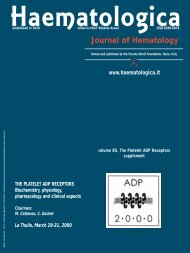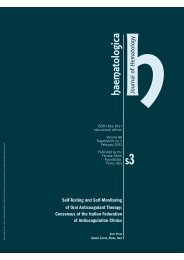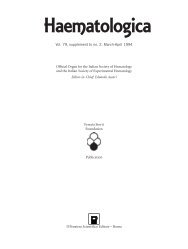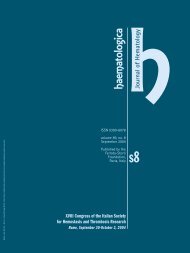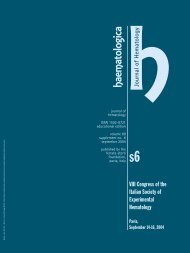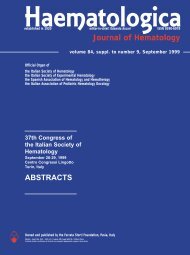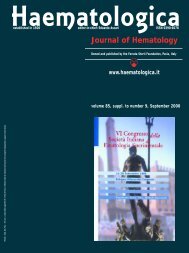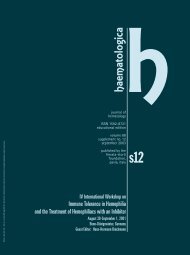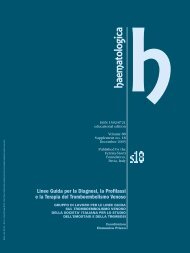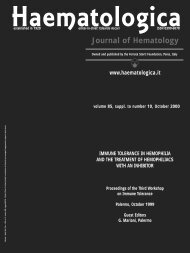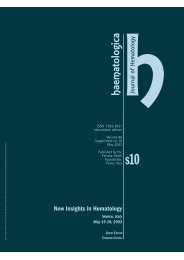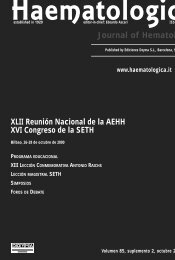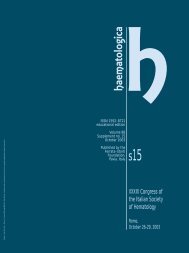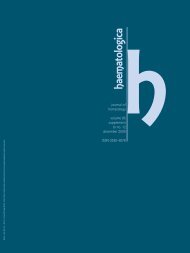Haematologica 2003 - Supplements
Haematologica 2003 - Supplements
Haematologica 2003 - Supplements
Create successful ePaper yourself
Turn your PDF publications into a flip-book with our unique Google optimized e-Paper software.
9.2 Renal complications.<br />
243<br />
MERIT – A new RCT of adjunctive plasma exchange in<br />
patients with newly diagnosed multiple myeloma and<br />
acute renal failure (ISRCTN37161699)<br />
D Samson, G Gaskin, J Behrens, N Iggo, M Drayson, J<br />
Dunn, G Jackson, K Hawkins, S Bell, J Lewis and J Brown.<br />
Imperial College Faculty of Medicine, London, UK; St Helier<br />
Hospital, Surrey, UK; Royal Sussex County Hospital, Brighton,<br />
UK; University of Birmingham, UK; Royal Victoria Infirmary,<br />
Newcastle, UK; Northern and Yorkshire Clinical Trials and<br />
Research Unit, University of Leeds, UK. Email:<br />
medseb@leeds.ac.uk<br />
Introduction: MERIT (MyEloma Renal Impairment Trial) is a<br />
new multicentre randomised controlled phase III trial for patients<br />
with newly diagnosed multiple myeloma and acute renal failure,<br />
developed on behalf of the UK Myeloma Forum and the UK<br />
Renal Association. The trial is funded jointly by the Leukaemia<br />
Research Foundation and Cancer Research UK and aims to<br />
recruit a total of 286 patients in five years.<br />
Aims: The primary aim of the trial is to determine whether the<br />
addition of plasma exchange to chemotherapy increases the<br />
likelihood of renal recovery in patients presenting with acute<br />
renal failure and newly diagnosed multiple myeloma. It is<br />
designed to detect an absolute improvement in recovery of renal<br />
function of 20% (from 20% to 40%) at the 5% (2 sided) level of<br />
significance. The primary endpoint will be the proportion of<br />
patients alive and dialysis-independent at 100 days.<br />
Secondary aims are to assess the value of plasma exchange on<br />
overall survival and quality of life, the value of renal histology in<br />
predicting recovery of renal function and the value of serum free<br />
light chain assay in determining response of the myeloma and<br />
recovery of renal function.<br />
Why is the trial necessary?: Severe renal impairment is a serious<br />
complication of multiple myeloma, contributing greatly to the<br />
morbidity of the disease, and occurs in up to 20% of patients at<br />
presentation. 25-50% of these patients will not respond to<br />
standard measures, such as rehydration and correction of<br />
hypercalcaemia. Overall, approximately 5% of all myeloma<br />
patients will require long-term dialysis. Light chains produced by<br />
the myeloma cells are thought to be responsible for much of the<br />
renal damage, on the basis of a number of experimental models.<br />
Plasma exchange removes free light chain and there are several<br />
anecdotal reports of improvement in renal function in patients<br />
following treatment. However, only two small randomised<br />
controlled trials have been published and they reached opposing<br />
conclusions regarding the value of plasma exchange.<br />
Main eligibility criteria<br />
Newly diagnosed myeloma<br />
Acute renal failure (creatinine >500µmol/l, urine output<br />



